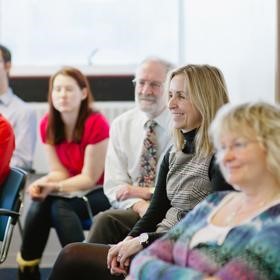New family nurse Lee reflects on "powerful" new techniques to engage clients - learnt at FNP Foundations training this summer
In July, we welcomed 47 new recruits to the 10th wave of FNP Foundations training – marking nearly a decade of FNP learning since the programme was introduced in England in 2007.
For these 42 family nurses and 5 supervisors, this is just the beginning of a year-long learning programme provided by the FNP National Unit which will continue for as long as they are delivering the FNP programme. As we welcome them on their FNP journey, we asked them to share their reflections about their very first FNP training session.
In the first of four blogs, Lee Pedley talks about an unexpected highlight of the training and how his work as a family nurse is different to his previous experience as a nurse and health visitor.
Lee recently joined the FNP team in Cornwall as a family nurse.
“All the people delivering the Foundations training were inspiring. Their enthusiasm was infectious! The whole training group were incredibly friendly and I really enjoyed that. Everyone was ready to listen, help and give support to each other. I made a few new connections with other family nurses and I’m looking forward to seeing them at later wave 10 training sessions.
“The role play was a highlight for me, funnily enough. I say that because I’m not the world’s greatest fan of role play, but the way it was done was really helpful. It was a safe space. It felt like we were all in it together.
“It was intense though, doing role play in front of others! But it prepares you for when you’re out delivering FNP. It’s helped me to work out how to use the facilitators effectively – genuinely for facilitating a conversation, rather than as a fact sheet.
“One thing that is different in FNP compared to my previous roles is that way of not telling clients what to do. It’s ingrained in you as a nurse and health visitor to tell people what to do because you have a set period of time to present the information you’re giving. As a health visitor, you share public health messages, but you never really know how much will go in.
“With FNP we’re delivering information in a totally different way and I enjoy that more. I’m not preaching. The communications skills help you build that relationship, you come across warmer. It instantly feels more effective.
“And there is of course information to share in FNP, but the focus is on eliciting what the client already knows and then pitching what you say at their level of understanding. It’s powerful.
“The realisation that I don’t have to download or dump info on the client is liberating. I feel like I can be so much more effective now.
“I’ve already had a chance to use these skills with a client. The elicit-provide-elicit model of sharing information and sense-checking understanding worked really well first time. The client really got on board with what I was sharing with her, and that’s really rewarding. I can see first-hand that this new way of working can make such a massive difference to young people and I realised that as soon as I started practising.
“It really cemented for me all the reasons I went for the family nurse job in the first place: being able to have time, developing my skills, to make a real difference. All health visitors will have some of the time and skills, but FNP gives you more on top of that – additional training, equipment, the programme itself.”
